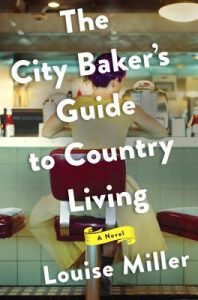The Baker’s Dozen—13 Lessons I Learned in the Kitchen that Made Me a Better Writer
 I have been writing fiction for about seven years, but I have been baking twenty-three years, and almost everything I needed to know about writing I learned in the kitchen.
I have been writing fiction for about seven years, but I have been baking twenty-three years, and almost everything I needed to know about writing I learned in the kitchen.
Mise en Place— This is a French cooking term that means to put everything in its place. It’s the practice of measuring out all of the ingredients before you begin a large project. You don’t want to have your butter and sugar perfectly creamed, only to find you are out of eggs. The same is true for writing. Even though I am not an outliner, it’s much easier to start your novel when you have established the basic elements. You need to have a sense of who your protagonist is. Knowing her external, or concrete, desire, and her internal, or abstract, desire tells you where you story is headed. Having the spine—the basic structure of the novel—in place will support you when you are exploring what is going to happen next.
Take care of your tools—Chefs take great pride in their knives, and take the time to keep them clean, sharpened and ready to use. The same rules apply to writers. Make sure the computer you write on is up-to-date. And for goodness sake, have a back-up system, and use it. I have known so many writers who lost their manuscript due to a computer crash. They all thought it would never happen to them. It did.
Have respect for the more experienced chefs in the kitchen. So much of what I have learned about cooking comes from watching and listening to the chefs. This is so important for writers. Take classes. Read as many books as possible. Read books in your genre and outside of your genre. Join a writers’ group that is made up of more experienced writers. Reach out to published authors. Go to conferences. Stay open and keep learning.
Clean as you go—In the kitchen, it is vital to keep a clean workstation—a tidy table makes you more organized and efficient. I find the same philosophy helps me with my drafts. I start my writing session each day by editing what I wrote the day before. Doing this helps me get back into the story, it often sparks new ideas and it keeps my working draft from becoming an unruly mess.
Learn the rules before you break the rules. Baking is a science. It requires precise measurements. When I want to try and make something new, say a sour cherry crème brulee, the first thing I do is go back to the basics. Once you know how to make a perfect classic crème brulee, you can start playing with the recipe. It is the same with writing a novel. You need a firm grasp of the elements of the story—where the story begins, where it ends, the critical events that need to happen, who the characters are and what their desires are—before you can start tinkering with multiple point of view characters or going back and forth in time.
The key to a good dish is balance—Just like a delicious dessert balances sweet and salty, soft and crunchy, hot and cold—make sure your characters voices are distinct, that you vary your sentence length, and that your scenes move from one emotional beat to another.
Teamwork is everything—There is nothing more important in a professional kitchen then a staff that works well together. We rely on each other, and that allows us to do our best work. I feel the same way about my writing community. Workshop friends and critique partners give vital feedback. Writing mentor-friends give you the inside scoop about the publishing process (and calm you down when you are freaking out). Agents and editors guide you through revising your work. Be team-oriented, and give back when you can.
 Don’t ignore your intuition—I can’t tell you how many times I have had a nagging feeling about a tray of shortbread in the oven, but chose to ignore it, only to open the oven door when the timer buzzed to find a tray of over-baked cookies. Chefs develop an intuition about their food. I work with a man who has been cooking for 30 years who never uses a timer. He can work on eight projects at the same time and everything is always perfect. When you find yourself trying to force your character go to a bar late one night, but she keeps insisting that she would rather stay home and read, don’t fight it. I can guarantee that you will end up deleting that bar scene eventually.
Don’t ignore your intuition—I can’t tell you how many times I have had a nagging feeling about a tray of shortbread in the oven, but chose to ignore it, only to open the oven door when the timer buzzed to find a tray of over-baked cookies. Chefs develop an intuition about their food. I work with a man who has been cooking for 30 years who never uses a timer. He can work on eight projects at the same time and everything is always perfect. When you find yourself trying to force your character go to a bar late one night, but she keeps insisting that she would rather stay home and read, don’t fight it. I can guarantee that you will end up deleting that bar scene eventually.
Test for doneness—A toothpick in the center of a cake will come clean, a chocolate chip cookie will feel slightly firm along the edge, a baked custard will be set on the surface, but will be a bit wobbly in the middle—these are the signs of doneness. In writing, when you think you are finished and ready to hit the marketplace, test for doneness first by giving your book to trusted readers for feedback before you send it out to an editor or magazine. Remember—you can only shop that short story to that editor once. Make sure it’s really ready.
Cuts and burns are inevitable—You work with sharp knives and take large pans out of a hot oven using only folded-up rags. You will get hurt. Those cuts and burns feel a lot like your first confusing workshop, or your stack of rejection letters from agents and editors, or when you realize you have to throw away a scene, or a chapter, or a whole book because they just aren’t working. Know that while writing is sometimes painful, it’s part of the process. And you will heal quickly.
Time management is key—As a pastry chef I need to think about oven temperature, oven space, stovetop space, cooling times—it’s a lot to juggle. So is life. If you have a job, or children, or a pack of dogs that need to be walked and fed, make sure you schedule time to write every day (or every weekend—whatever works for you), make it realistic, and keep to it.
Have Patience—Yeast dough takes time to rise. Pickles need time to pickle. Pork needs time to marinate. Same with your writing career. Let yourself be where you are. Work hard, but take your time. Don’t get caught up in your friend’s book deal or your critique partner’s short story award. Honor you process, and let go of comparing yourself to others.
Make what you love—the best chefs are dedicated to making what they are passionate about—that could be exquisitely crafted duck confit or the crispiest corn dog at the county fair. This is also true of writers. Write what you feel passionate about. Write what you love to read. Write the stories that you find yourself dreaming up on the subway. Don’t worry if they aren’t literary enough or dystopian enough or romantic enough. Just follow what excites you. You will find your readers. I promise.
—
Louise Miller is a writer and pastry chef living in Boston, MA. She is the author of THE CITY BAKER’S GUIDE TO COUNTRY LIVING (Pamela Dorman Books/Viking). Louise is an art school dropout, an amateur flower gardener, an old-time banjo player, an obsessive moviegoer, and a champion of old dogs.
Follow her on Twitter @louisethebaker
Find out more about her on her website http://louisemillerauthor.tumblr.com/
Category: How To and Tips

























I love your writing style. Just reading this post has me wanting to check out The City Baker’s Guide to Country Living.
thanks so much, Barbara. I hope you enjoy it!
Lots of useful information her. Your writing/teaching style is very effective. Congratulations on your success.
Thank you so much, Mary!